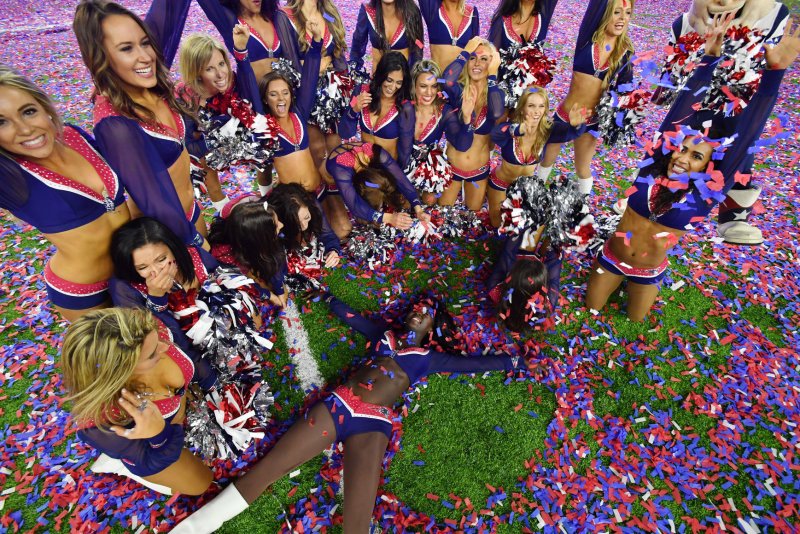1 of 3 | New England Patriots cheerleaders celebrate after their team defeated the Atlanta Falcons in Super Bowl LI at NRG Stadium in Houston on February 5, 2017. The Patriots defeated the Falcons 34-28 in the Super Bowl's first overtime game. Photo by Kevin Dietsch/UPI |
License Photo
HOUSTON -- Let's get this out of the way first, so there is no misunderstanding. The New England Patriots are the greatest NFL dynasty of the Super Bowl era, the best since the Green Bay Packers of the 1960s, and they are doing it in an era where the rules are specifically tailored to prevent a dynasty.
No one can question that, not the '70s Steelers, the '80s 49ers or the '90s Cowboys.
But achieving that level, much as baseball's New York Yankees used to use the Kansas City A's almost as a farm team when they needed to obtain another player, involves something more than a team's own greatness.
It frequently involves the acquiescence of an opponent that, in the face of greatness, does just enough dumb things to help the dynasty continue along.
Surely, you have to think the Atlanta Falcons, not the Patriots, would have won Super Bowl LI if they had played smarter once they got a big lead. If, with a 16-point lead in the fourth quarter, they were satisfied to run for a first down on third-and-1 instead of having Matt Ryan drop way back, exposing him to a sack and a fumble that led to an easy New England touchdown.
Or, if the Falcons, still ahead by eight points, had played for a field goal later in the fourth quarter after reaching the Patriots' 22-yard line, instead of having Ryan again drop way back, exposing him to another sack that took Atlanta out of field-goal range.
You have to wonder how long it will take Kyle Shanahan, the Falcons' offensive coordinator, to get those play calls out of his mind as he begins his new gig with the San Francisco 49ers, who are about to name him as their head coach.
Maybe somebody in San Francisco can tell him what happens when you go up against a dynastic team. That dynasty does not have superhuman powers, but it sometimes seems to acquire them in the way an opponent goes about its business. The 49ers' dynasty that won five Super Bowls between 1981 and 1994 surely benefitted from what, for better or worse, could be termed brain lock by an opponent.
Atlanta, of course, was not the first team to suffer that problem. In Seattle, they will never forget the interception Russell Wilson threw from the 1-yard line in the final minute of the Super Bowl two years ago, when logic dictated a run by Marshawn Lynch that likely would have won the game. That play handed the Patriots their fourth Super Bowl trophy.
In the immediate aftermath of Super Bowl LI, in which the Patriots won their fifth Super Bowl trophy, Dan Quinn, the Falcons' head coach (and, coincidentally, formerly an assistant coach with the 49ers), defended the way his team attacked New England. He didn't seem to have a problem with the play calls that exposed Ryan to the critical sacks at a time when the Falcons should have been protecting a comfortable lead.
Neither did Ryan, who said, "We played the way that we play. We always play aggressive and play to win."
Of course, there is a difference between being aggressive and being smart.
Although there is probably no one left in the 49ers' building who remembers the great days that franchise used to enjoy, the fact is the San Francisco mystique was built in part by the same kind of brain lock that helped the Patriots beat the Falcons.
For example, there was the time the New Orleans Saints could have just about run out the clock to beat the 49ers, but rather than going with the ground game, but they called for quarterback Bobby Hebert to pass. The ball fell incomplete, leaving Joe Montana 15 seconds deep in his own territory. Although the 49ers were out of timeouts, the clock stoppage left San Francisco enough time to work downfield and kick a winning field goal.
Or there was the time in Green Bay, before the Packers' revival began, that the Packers decided a short kickoff was in order late in the second quarter. The result was that the 49ers had such good field position, they scored that time, too.
The explanation, of course, was simply that opponents did not want to give Montana the ball. Instead, they not only gave him the ball but gave it to him in position where he could do some damage.
In fact, the mystique was so strong that after the Saints beat the 49ers once at Candlestick Park in a game Montana did not play due to injury, the late Jim Finks, then the Saints' general manager, said San Francisco would have won if it simply had Montana stand on the sideline during the game.
Yes, the mystique of a great team and great player is that strong.
And the Patriots and Brady are, without question, really great.
Ira Miller is an award-winning sportswriter who has covered the National Football League for more than five decades and is a member of the Pro Football Hall of Fame Selection Committee. He is a national columnist for The Sports Xchange.















